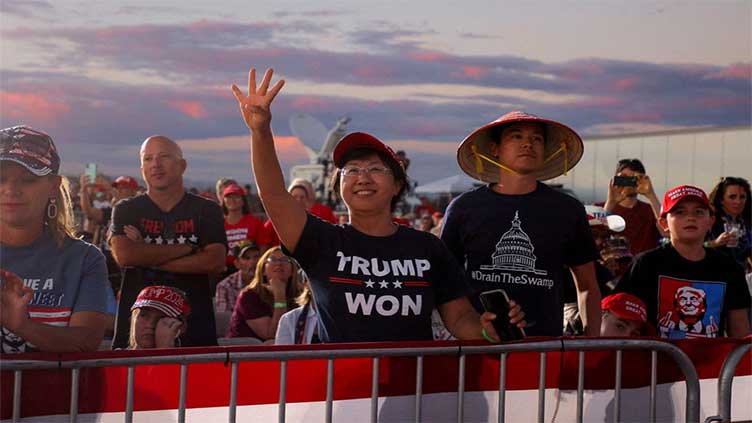Why a small midterm race in Arizona could have big consequences for U.S. democracy

World
Why a small midterm race in Arizona could have big consequences for U.S. democracy
(Reuters) - The fight to become Arizona’s next attorney general in November’s midterm elections smashed fundraising records this week.
One major reason: the normally backwater contest has potentially big implications for U.S. democracy, election experts said.
Arizona is a kingmaker state in U.S. presidential elections, and under Arizona law the attorney general must witness the certification of the election result, has the power to challenge certifications in the courts if they violate state law, and must approve the rulebook that governs how elections are run.
Former President Donald Trump has endorsed the Republican attorney general candidate Abe Hamadeh and appeared on stage with him.
Hamadeh has offered his own endorsement: a full-throated support for Trump’s false claims that the 2020 election was stolen from him by President Joe Biden.
As a result, a race usually viewed as an electoral afterthought has attracted record amounts of money and attention from Democrats and Republicans.
Democratic nominee Kris Mayes raised $1.25 million in the third quarter of 2022, bringing her total amount of money received so far during the 2022 election cycle to $2.2 million, while Hamadeh raised $740,000 between July and September, bringing his total to nearly $1.8 million, according to Arizona’s office of Secretary of State.
That compares to a total haul of less then $2 million by both candidates in 2018, then an Arizona record.
The fate of U.S. democracy is not the only reason money is pouring into the race this year. The U.S. Supreme Court’s decision to end a women’s constitutional right to an abortion triggered donations, and around the country attorney general races are garnering more attention and money generally because of their ability to enforce or block controversial policies.
Trump’s backing of Hamadeh is notable because it is unusual for a former president to endorse an attorney general candidate. Amy Klobuchar, a Democratic U.S. senator from Minnesota and a 2020 presidential candidate, meanwhile, appeared at an event with Mayes last month.
Klobuchar told Reuters it was vital to elect officials, including attorney generals, "that are critical frontline protection when it comes to voting and elections."
The importance of the attorney-general race is underscored by polls showing that Republicans Kari Lake, who is running for governor of Arizona, and Mark Finchem, the secretary of state candidate, could win this November. If victorious, they would have control over how votes are counted and certified in a state Biden narrowly won in 2020.
Both have said that Biden’s victory was fraudulent and Finchem, who was outside the U.S. Capitol during the Jan. 6, 2021 attack by pro-Trump supporters, has said he would not have certified Biden’s win if he had held the office then.
“I think that American democracy runs through the state of Arizona in 2022,” Mayes said in an interview with Reuters.
AG EMPOWERED TO STEP IN
Hamadeh downplayed the role an attorney general has in election certification in a statement to Reuters. Mayes is running a "desperate" campaign "to undermine my commitment to our country and our democratic processes," he said.
But at a July rally attended by Trump, Hamadeh made comments strongly suggesting he viewed the position as pivotal in the election process.
"Arizona right now needs a warrior as attorney general. I will fight to secure our elections so when Donald Trump runs again and wins in 2024 everyone will know it’s legitimate.”
Dozens of Republicans who support Trump’s false claims of fraud have been nominated for local and state offices across the country this November, potentially placing them in charge of their state’s 2024 presidential elections. This has brought unprecedented attention to down-ballot races in battleground states like Arizona, Michigan and Pennsylvania.
Lawrence Douglas, an election law expert at Amherst College, said Arizona’s attorney general race has become one of the central contests in the fight against deniers of the 2020 presidential election result. Biden won Arizona by just 12,000 votes.
“What look like these relatively inconsequential races will have enormous consequences in terms of the 2024 presidential election,” Douglas said.
Tammy Patrick, a former federal compliance officer in the Maricopa County Elections Department - Arizona’s most populous county - said the attorney general is a vital position if either the governor or secretary of state attempt to certify a result that does not reflect the true vote total.
"If you have office holders who are trying to change the outcome of the election through the certification process, it’s incumbent on the attorney general to step in because they have sworn to uphold the laws of Arizona and the United States," Patrick said.
Stefanie Lindquist, a law and political professor at Arizona State University, said the attorney general has the authority to sue to enforce the state’s election laws "through civil or criminal actions."

